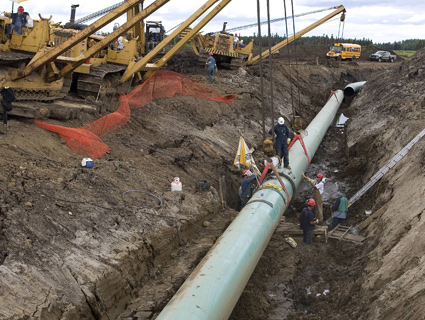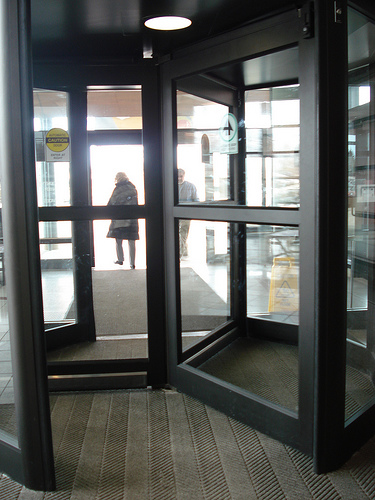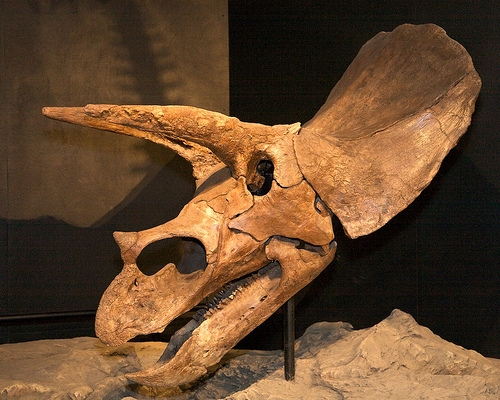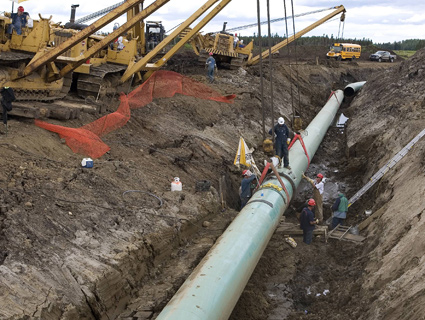
Construction on the existing Keystone pipeline.Imago/ZUMA
Emails released by the State Department through a Freedom of Information Act (FOIA) request show a close relationship between the top lobbyist for energy company TransCanada and a US diplomat—a relationship that environmental groups say has compromised the agency’s ability to make a fair decision on the company’s proposed Keystone XL pipeline.
The ties between Paul Elliott, TransCanada’s director of government relations, and the State Department have come under considerable scrutiny as the company has sought the agency’s approval to build a 1,661-mile pipeline from Alberta, Canada, to Texas. Before going to work for TransCanada, Elliott served as the national deputy director for Hillary Clinton’s 2008 presidential campaign. The environmental group Friends of the Earth filed a FOIA request in December 2010 seeking emails and other documents concerning Elliot’s contact with State Department employees. (The group released a first round of documents several weeks ago.) The more notable emails in this most recent round is correspondence between Elliott and Marja Verloop, the counselor for environment, science, technology, and health at the US embassy in Canada. Verloop appears to be a key point of contact between the embassy and TransCanada.
In a September 2010 email, Verloop celebrates after Elliott informs her that he’s secured support for the pipeline project from Sen. Max Baucus (D-Mont.). “Go Paul!” she writes. “Baucus support holds clout.” Other emails highlight a friendly relationship between the two, with Verloop asking Elliott when he planned to come up to Ottawa again. “When are you coming up to visit?” she wrote. “It’s a snowy winter wonderland here this morning.” (See all the emails here, here, here, here, and here.)
To pipeline critics, the most significant messages may be an exchange in which Verloop and her boss, US Ambassador to Canada David Jacobson, discuss an apparent understanding between the State Department and TransCanada that the company would later seek to raise the pressure used to pump oil through the pipeline—even though the company said publicly it would do the opposite. To alleviate concerns about pipeline safety, TransCanada had announced in August 2010 that it would lower the pressure that it planned to use in the pipeline, in response “to the concerns of the public and various political leaders,” as Robert Jones, the vice president of TransCanada’s Keystone pipelines division, said at the time. The lower pressure would conform to US standards and was meant to alleviate concerns about the pipeline rupturing.
But in a July 26, 2010 email Elliott told Verloop that the company still intended to apply for permission to increase pressure in the pipeline when “there is better information in the public domain on the engineering safety of such pipe design and operation.” Verloop forwarded the email to Jacobson the following day, and described TransCanada as “comfortable and on board” with the decision-making process. The exchange indicates that the State Department was aware of TransCanada’s intention to increase the pressure in the future, even as the company was telling the public a different story.
TransCanada’s decision to decrease the pipeline pressure helped the company win high-profile support from lawmakers including Sen. Jon Tester (D-Mont.), who issued a press release touting the change as a “win for energy development” and a “win for higher safety standards in rural America.”
Also telling is a December 2010 exchange between Verloop and Elliott, shortly after environmental groups started raising concerns about his ties to the State Department. Verloop forwarded a story to him from Energy and Environment Daily about the concerns. In his reply, Elliot noted that he had a “sick feeling” over the complaints. Verloop responds with encouragement: “[I]t’s precisely because you have connections that you’re sought after and hired.”
The emails also make it clear that Elliott was actively lobbying congressional lawmakers and State Department officials for at least a year-and-a-half before he officially registered as a lobbyist. According to lobbying disclosure records, Elliott did not officially register until December 16, 2010—three days after Friends of the Earth filed its FOIA request concerning his contact with the State Department. FOE has asked the Department of Justice to investigate whether Elliott violated the Foreign Agents Registration Act by failing to register earlier as a lobbyist for the Canadian company.
The messages, says Friends of the Earth climate and energy director Damon Moglen, should disqualify the State Department from rendering a determination both the environmental impact of the pipeline and whether the pipeline project is in the national interest.
“What you really see is an agency that was supposed to be conducting an independent, objective, searching, science-based environmental analysis was basically working in cahoots with this oil company,” Moglen told Mother Jones. “We’re not just talking about bias, we’re talking about complicity.”
A State Department spokesman disputed that interpretation, however. “We are committed to a fair, transparent and thorough process,” the spokesman told Mother Jones. “Throughout the process we have been in communication with industry as well as environmental groups, both in the United States and in Canada. These conversations are similar to the public meetings we held last week. We listen to all opinions, but there is much more that goes into the national interest determination decision.”














